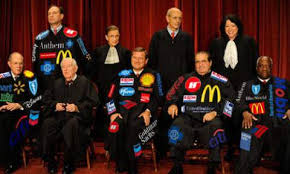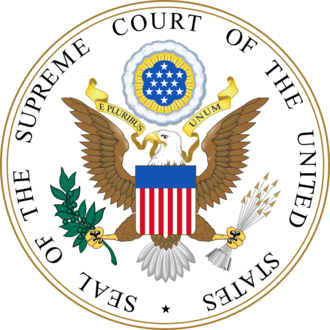US/Supreme Court
(Supreme court) | |
|---|---|
 A mock up of how the group might look given clearer display of corporate loyalties | |
 | |
| Formation | 1789 |
| Parent organization | US |
| Headquarters | Washington D.C. |
| Leader | Chief Justice of the United States |
| Type | |
| Interest of | Linda Greenhouse |
| The highest court of the US, appointed by congress and their president, and therefore also influenced and controlled by elements of the corrupt US/DS. | |
The US supreme court is the highest ranking court in the US.
Contents
Rulings
In June 2013 the court confirmed a federal appeals court ruling about Donald Rumsfeld by claiming that be cannot be held liable for any illegal actions of his subordinates. He was being sued for personally authorising "enhanced interrogation" techniques.[1][2]
Immunity for manufacturers of generic drugs
In a 5-4 vote on July 7, 2013, the US Supreme Court ruled that Karen Bartlett had no right to sue Mutual Pharma, after a drug they made, the generic anti-inflammatory drug Sulindac, caused her to develop toxic epidermal necrolysis as a side effect. A lower court awarded her $21 million in compensation, stating that “Because it is impossible for Mutual and other similarly situated manufacturers to comply with both state and federal law, New Hampshire's warning-based design-defect cause of action is pre-empted with respect to FDA-approved drugs sold in interstate commerce." Whiteout Press summarised the implications of this ruling as follows "In other words, if the FDA says something is safe, it doesn’t matter if that decision is wrong or the result of lies, fraud or deception on the part of the world’s pharmaceutical companies. And there’s no way to sue the FDA for being wrong and costing millions of unsuspecting Americans their lives."[3]
"Official Acts"
A 2024 ruling requested by Donald Trump resulted in a ruling that made a distinction between "official acts" and "not official acts" by a president, in deciding when a US President should personally be prosecuted. The ruling made 3 new "acts" to be classified[4];
Official acts that rely on core constitutional powers, for which “immunity must be absolute” Official actions “within the outer perimeter” of official responsibility, that require at least presumed immunity Unofficial actions while in office, from which the president has no immunity
Legal Case
| Name | Plaintiff(s) | Defendant(s) | Start | End | Description |
|---|---|---|---|---|---|
| Clapper v. Amnesty International USA | James Clapper | Amnesty International USA | 29 October 2012 | 26 February 2013 | James Clapper sought to dismiss Amnesty International's challenge of the Fisa Amendments Act. They Supreme Court ruled that dragnet surveillance could not be challenged since the plaintiffs were unlikely to be targets of surveillance - something that was revealed a few months later by the Edward Snowden leaks to be untrue. The decision appear to be nevertheless unchallenged. |
Related Quotation
| Page | Quote | Author | Date |
|---|---|---|---|
| Thomas Jefferson | “To consider the judges as the ultimate arbiters of all constitutional questions [is] a very dangerous doctrine indeed, and one which would place us under the despotism of an oligarchy. Our judges are as honest as other men and not more so. They have with others the same passions for party, for power, and the privilege of their corps. Their maxim is boni judicis est ampliare jurisdictionem [good justice is broad jurisdiction], and their power the more dangerous as they are in office for life and not responsible, as the other functionaries are, to the elective control. The Constitution has erected no such single tribunal, knowing that to whatever hands confided, with the corruptions of time and party, its members would become despots. It has more wisely made all the departments co-equal and co-sovereign within themselves.” | Thomas Jefferson | 1820 |
References
- ↑ www.huffingtonpost.com/2013/06/10/supreme-court-donald-rumsfeld_n_3415124.html
- ↑ http://rt.com/usa/supreme-rumsfeld-vance-court-493/
- ↑ July 7, 2013Supreme Court rules Drug Companies exempt from Lawsuits
- ↑ https://www.pbs.org/newshour/politics/what-does-the-supreme-court-ruling-mean-for-trump-6-questions-answered